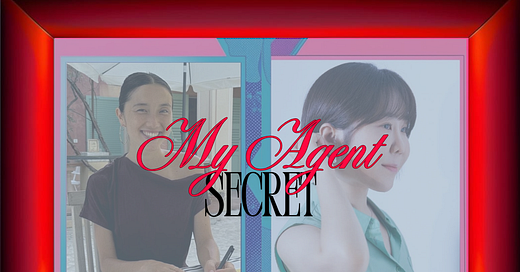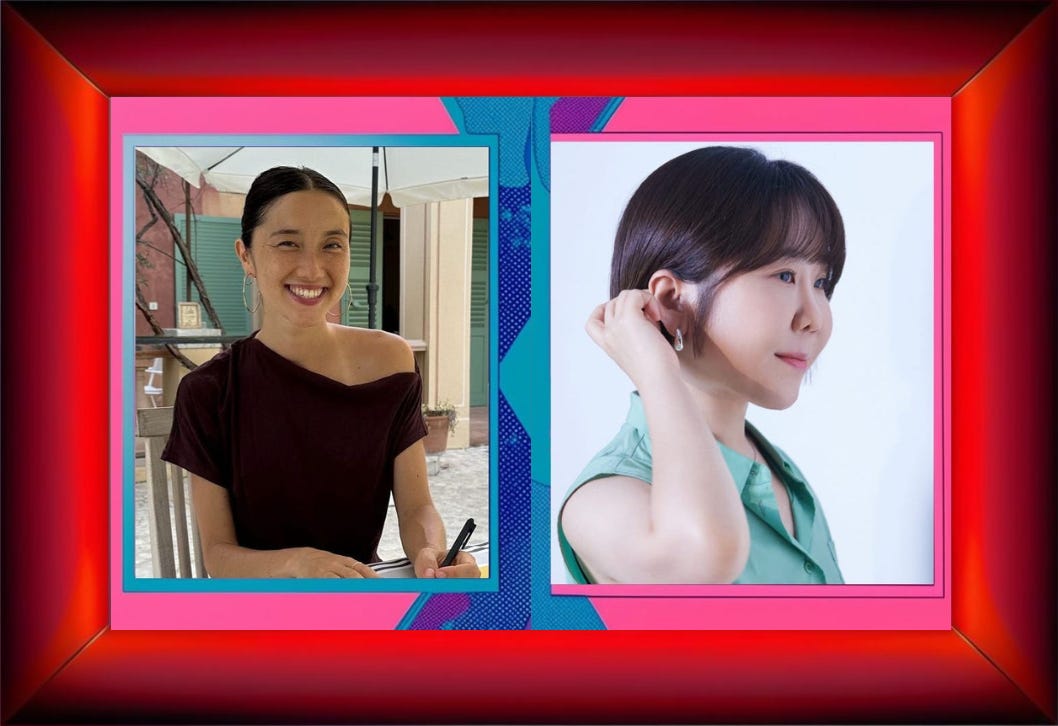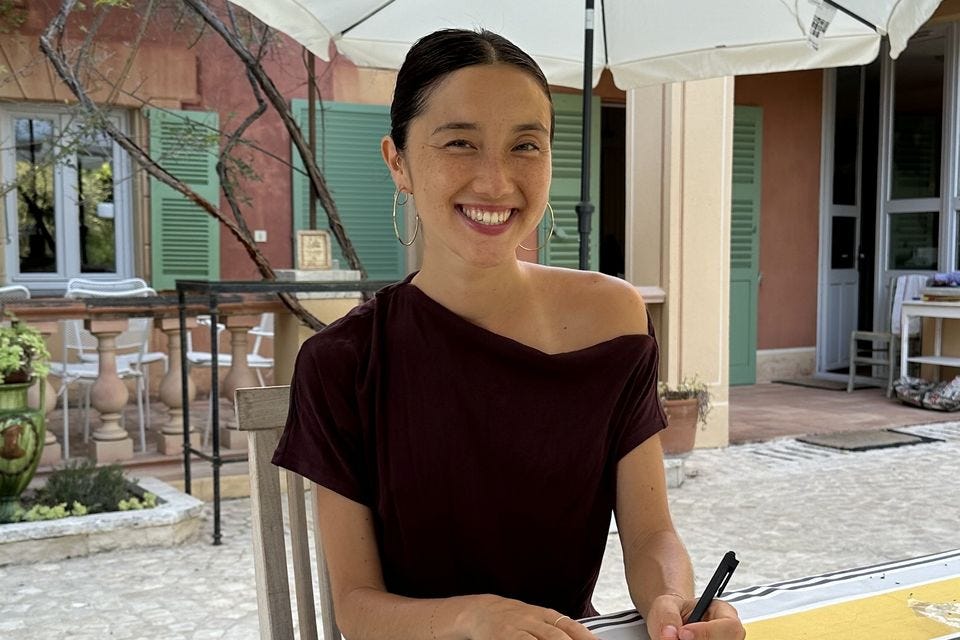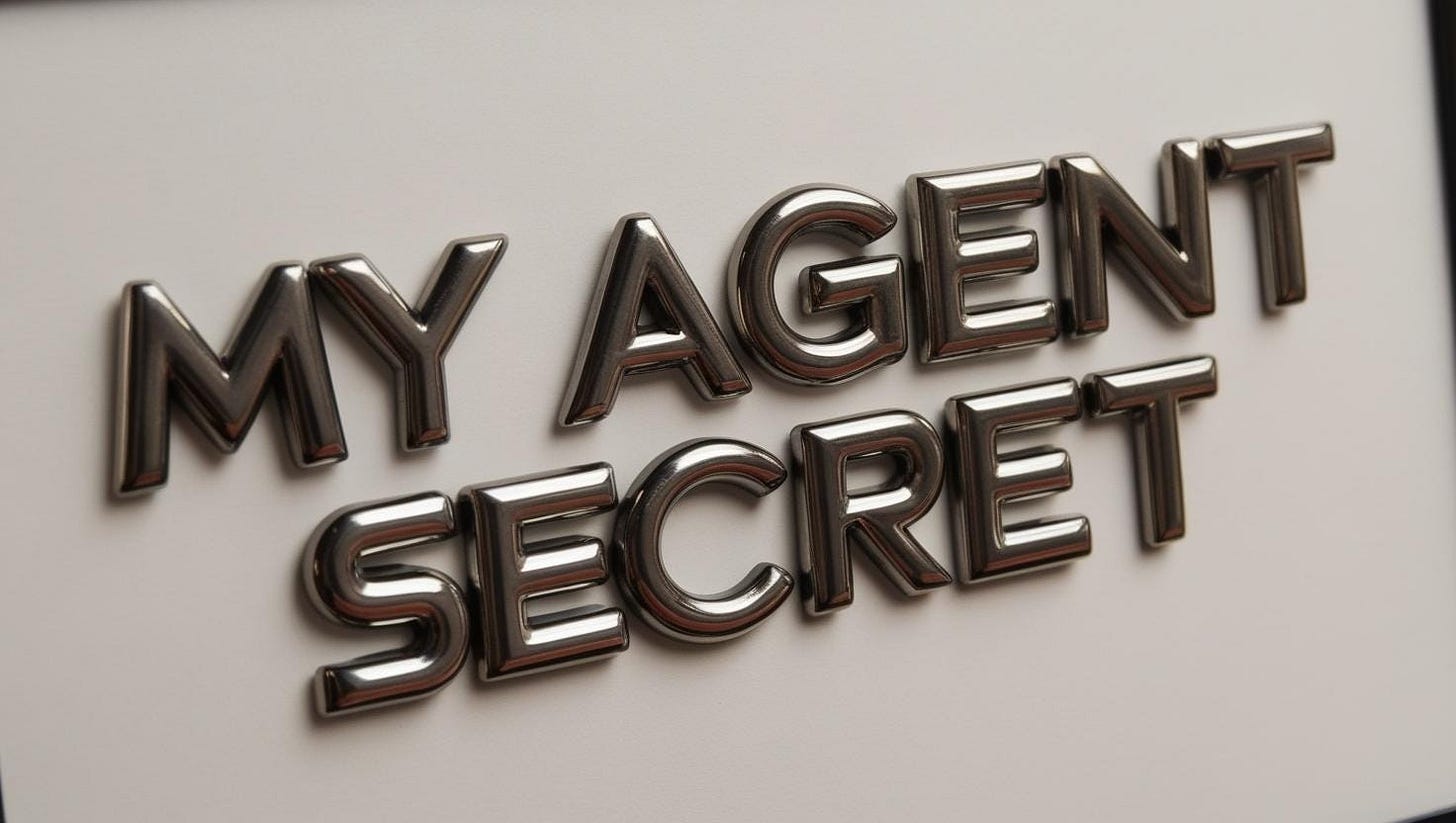Let us introduce you to Amil
One of Edwina's authors, who will be published by Penguin this summer.
Dear My Agent Secret Follower,
Today we’ve got news from our newsiest agent Edwina de Charnacé whose come all the way from Korea with tidings of one of her new authors, Amil.
If you’re curious to hear about Amil at the beginning of her international career and what her relationship with Edwina looks like keep reading.
🚨 ACTION POINT AT THE END 🚨
🎯 Amil’s collection of short stories is prompting the first MY AGENT SECRET competition 🎯
More information to come.
Conversation between Edwina and Amil:
Edwina, Literary Agent at Mulcahy Sweeney Literary Agency
Amil, literary/upmarket fiction author from South Korea finding international success (in part) thanks to Edwina’s hard work and hyper-charm. Amil’s work was originally published in Korea by Viche/Gimmyoung and will now be published in English with Harvill Secker/Vintage by Penguin Press.
Setting: lunch of soba noodles dunked in warming broth in Seoul’s trendy Seongsu neighbourhood.
[CONVERSATION BEGINS.]
It has been edited for vitesse.
EDWINA: I want to ask you about the distinction between genre and literary fiction. Your collection of short stories (ROADKILL) is much more literary than your novel… do you think of yourself as a genre or a literary writer, or do you not even think in those categories?
AMIL: It’s tricky… I’ve always thought of myself as being somewhere in between. When I started writing I was profoundly affected by the fantasy and SFF genres, which were great motivators. But at the same time, my favourite author when I was a teenager wasn’t a fantasy author but a literary fiction author called Shin Kyung-sook. I practised my sentences by copying out her writing––I studied writing from her fiction. That was a huge influence on me. But my close friends, writer friends and writing circles, are rooted in the fantasy community.
EDWINA: The word community feels important here. In the UK there’s a big distinction between genre and literary communities. Genre readers, whether it’s fantasy/science fiction/horror/crime have so many accessible and inclusive communities to join either through in person conventions or online forums… but there doesn’t seem to be the same sense of community for literary fiction––is literary fiction a solitary reading experience whilst genre offers shared universe?
AMIL: I’m paraphrasing here, but do you know Azuma Hiroki? He said that genre, particularly Otaku culture1 is filled with codes. So it’s less about the content and more about codes. In genre there are typical characters and plots which fans can study and recognise so they can anticipate the story’s trajectory. It’s a game of expectation. I think that expectation is what creates the shared experience. The expect-ing isn’t a spoiler but an experience in and of itself which is fun and engaging––maybe that’s what makes the community more intimate? In Korea, literary fiction does have a formal community but it feels more like an aspiring writers’ community. The genre community don’t necessarily want to be writers. Whereas literary readers are always harbouring some desire to write.
EDWINA: Yes, I think the same is true in the UK… I have a question now about reading other people’s writing when you’re in the middle of completing a project, do you find it helpful to read other people’s work or inhibiting? Are you wary of absorbing someone else’s style?
AMIL: Mmmm.. when I was younger I didn’t want to be affected by other writers, so I didn’t read other people’s writing when I was in the middle of a project. But nowadays I don’t really care… my writing style has become more concrete so even when I read other fiction, it doesn’t affect my writing. I feel safe in my writing.
EDWINA: That’s cool. And what do you make of the notion of ownership in writing? Do you think authors own their characters and universes or do you think it’s fair game for anyone to borrow, take, imitate?
AMIL: I concede that absolute ownership is impossible because everything has a precedent. We’re always borrowing from the past, from our ancestors, so nothing can really be called new. But I think ownership is important in spite of this, because it’s how we take responsibility for our creations. I am the owner of my creations, my characters, so I have to take care of how they’re reacted to. That makes me a responsible writer.
EDWINA: Ownership as a form of accountability. That’s really smart, I hadn’t thought of it that way.
AMIL: Yeah.
EDWINA: I’m also wondering about your relationship to words in your interpersonal relationships... words are obviously your craft, but do you think of yourself as a good communicator?
AMIL: A good communicator in my daily life? I do think of myself as a good communicator… or at least, I used to (laughs). Nowadays, I’m not so sure. I’ve recently moved in with my girlfriend… of course, you know MBTI? I’m ENTJ.
EDWINA: You’re ENTJ? (sounds very surprised). I’m INFJ.
Disclaimer: Amil’s Myers Briggs Personality Type shortened to MBTI in Korea is far more prevalent in popular culture than astrology.
AMIL: I’m really, very ‘T’ (thinking) and ‘J’ (judging). Very thinking-based. I used to think I was getting more and more emotional and learning to focus more on feeling rather than thinking. Especially since going to therapy. Therapy is where I learned about the importance of feelings and emotions. Even when you think you’re making very rational decisions they’re inevitably based on feelings so we have to admit and accept our feelings. But (laughs), when I fight with my girlfriend, I still always think my way is the most rational way, and she tells me I’m not being frank. I discovered I’m not very good at expressing my emotions to her or carrying her emotions in me. I think I have to learn more about communicating to accept and express emotions.
EDWINA: It makes sense to me that so many novelists struggle with writing dialogue. Making a conversation between characters feel realistic is tough because real-life conversations are often messy and unresolved. Committing that to the page as concrete words is like trying to put a solid casing or frame around something liquid. Do you find writing dialogue easy?
AMIL: I used to struggle with dialogue. I got feedback from early readers calling me out for being bad at writing conversations between my characters. Nowadays, I find it much easier. I don’t know how I overcame the blockage, but I find it easy now.
EDWINA: Are any of the conversations in your novels or stories based on real-life conversations?
AMIL: No, never. I like writing conflict between characters because it creates energy and tension. That’s fun for me to write. Most of the time, those conflicts or conversations exist in my mind as an inner conflict.
EDWINA: As in, you’re externalising your inner conflict as a conversation between two characters?
AMIL: Yes exactly. I think everyone has internal battles between one ego saying this and another ego saying that. I constantly have these internal conversations. So when I write them down in my fiction, it’s…how can I put it…
EDWINA: It’s like your internal conflicts create different characters? The contradictions you contain are spread across various people, right?
AMIL: Yes, yes. That’s true. Writing gives us the chance to notice feelings we didn’t even realise we were sitting on. We discover our inner conflicts through our writing. Which is… emancipating?
EDWINA: Yeah, sounds therapeutic. You mentioned getting feedback from early readers faulting your dialogue. Where did you get that from?
AMIL: It was a long time ago… ah, actually that criticism was from a friend. I showed him my writing and asked for his opinion. He teased me saying ‘you write so well but why do you suck at dialogue’ (giggles)
EDWINA: So what’s your relationship to constructive feedback?
AMIL: I don’t believe writers who say they’re okay with negative feedback. That’s just a lie.
(laugh together)
EDWINA: I’m pretty sure I recently heard another author say something similar. It’s very honest. So in this particular case, the reader was one of your friends, but do you have much interaction with readers you don’t know? I ask because authors seem more public facing in the UK and US than in Korea…
AMIL: You mean readers I don’t know personally? Yes I engage with them on Twitter or on social media. And at book events.
EDWINA: How do you feel discussing your works at these events? Do you feel connected to your writing?
AMIL: I don’t know about other writers but to be honest, I don’t like talking about my writing. When I write fiction and it’s been published, I feel like my work is done. The rest is up to the public. Whenever I talk about my writing I feel like I’m deciding how readers should receive my work. I don’t think that’s right. Readers are entitled to their freedom to interpret my works for themselves. I don’t want to intrude on that experience. But anyway, because of promotional obligations, I have to talk about my books, so it doesn’t matter whether I like to do so or not. It’s hard. I want to be a responsible writer. So when readers ask me about my work, I have to give answers but at the same time, I have to leave them the freedom to form their own opinions. It’s a balance, I guess.
[ENDS.]
This is Amil’s collection of short stories to be published in August by Penguin:
********ROADKILL********
Translated by Archana Madhavan.
Pre-order here. (Waterstones)
ROADKILL is a collection of subversive dystopian short stories transporting readers across 6 distinct universes that redefine innocence as power through their shared visual vocabulary and unconventional damsels in distress.
🎯 MY AGENT SECRET COMPETITION #1 🎯
We will be running a competition to celebrate the release of Amil’s collection of short stories ROADKILL.
We will invite members of the My Agent Secret community to write a response to reading ROADKILL (between 500-1500 words). Winner will get a prize obviously. Prize still TBD.
Deadline: end of September
Judges: Edwina, Ivan Mulcahy & Tilly Vercoutre
All submissions will be considered
We’ll send more information in the months to come
Otherwise, for now, just have a great week and channel the London Book Fair from wherever you are (talk about books.)
Best
Tilly
Comment thoughts, feelings and a special “🎯” if you’re interested in our first competition.
“In Japanese otaku is similar to the English word “geek” or “nerd” and refers to obsessive young people who are obsessed with anime and manga to the point of becoming social outcasts. The term gained broader recognition in Japan after 1989 when a notorious crime by an otaku, Tsutomu Miyazaki, sparked intense media coverage and public debate about social alienation.)”
This is a helpful introduction to otaku culture from Alex Honey who wrote about it for DAZED.
Read Honey’s whole article here.
(Thanks
.)











anyone feeling competitive? 🎯?
I haven't read anything by Amil yet... but i'm excited to. I love and appreciate all her "i don't know's..." I love the honesty of the I don't know...
My first three letters are the same as Amil's so i guess we share 75% of the same personality DNA? Hey Amil. The biggest difference I note here is that there are some authors I can't read if i'm trying to write (or just make it feel easier...) certain mammoths who give me serios stage fright... but I guess that's just ego. And self-assuredness. One day, like Amil, I'm sure it won't affect me so much.
From personal experience now big love to the experience of talking over food with Edwina 💘